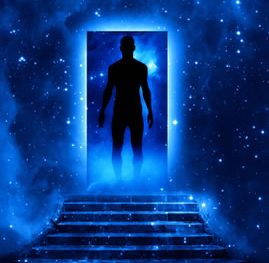Reincarnation
The notion of reincarnation is ancient and obscure, yet belief in it is prolific: it spans all continents and many societies and religions across known history and lives to this present day as a philosophy incurring varying degrees of acceptance.
The earliest evidence of reincarnation is in the Hindu Vedic scriptures from several hundred years BC, although the exact time period is not known (3). In the 1st Century, Druidic belief in it was recorded by Greek philosopher Stabo (13, 19), and in the 6th Century, Greek philosophers Plato and Pythagoras taught that the soul was immortal and goes through a series of births, deaths and re-births (19, 20).
As these cultures come from very different areas of the world, it is interesting to consider if the spread of this notion is likely to have arisen through cultural contact, or whether it happened independently through the meditations and Shamanic practices handed down through the generations, holding in reverence the energies of both Earthly and Spiritual dimensions. Certainly, as early cultures accepted and respected the cycles of life in the world around them, such as the seasons, the passing of days and nights and the phases of the moon, it was maybe no great stretch for them to believe that human existence was cyclical, too (13, 19).
Early Christians, including the Gnostics, also believed in reincarnation, but any reference to it (and other unwanted beliefs) were removed by the Council of Nicaea in 325 AD, by destroying the relevant texts, and any belief in reincarnation was declared as heresy by the Council of Constantinople in 553 (19, 20, 34), presumably because the notion removed the threat of eternal hell and damnation (and, therefore, control of the people).
Because of the denial of reincarnation by the Church, it has for many years been frowned on or considered taboo amongst Christians (34), who retain only a belief in an afterlife through the resurrection. It is also vehemently denied by many Muslims, who likewise draw on the teachings of Islam in the Holy Quran (Koran) to refute the idea (23). Interestingly, though, there are those in both faiths who point to Christian and Islamic Scriptures to support the notion of reincarnation:
"The Koran itself seems quite clear: "And you were dead, and He brought you back to life. And He shall cause you to die, and shall bring you back to life, and in the end shall gather you unto Himself." (2:28) [22].
And there is clear implication of it in Matthew 11:14, when Jesus was asked if John the Baptist was Elijah returned, and again in John 9:2, when the apostles ask Jesus whether a blind man is blind because of a sin he committed or whether it was his parents' sin: they were, after all, Jewish and reincarnation was an accepted belief in traditional Judaism (10).
Of course, this might be the Old Testament reference to 'the sins of the father being visited upon the son' (Exodus 34:6-7), but in this context it could equally refer to the Eastern concept of atoning for a sin committed in a previous lifetime - 'karma'. Karma is a Sanskrit word meaning 'deed' or 'action', perhaps more commonly thought of in its consequential meaning of 'cause and effect' (9), although there appears to be no word for this concept in traditional Judaism (indeed, some Rabbis would dispute the existence of the concept itself) (7). It is also present in the Bible in other places (29, 33) where it necessarily seems connected with the idea of re-birth.
Despite being such a 'hot potato', the belief in reincarnation seems to have survived in almost all cultures across the world:
- Australia: The Aborigines believe that infants are their dead ancestors returned and that souls are continually reborn (19)
- China: Acknowledged in Taoism (28)
- Indian subcontinent: Central to Hinduism, Buddhism, Jainism, Sikhism, some sects of
- Islam, such as the Ghulat and the Druzes (10)
- Far East: Expectant mothers in Bali ask the village healers to communicate with their unborn child to discover what its purpose is in this life (30).
- North America: The Inuits of Alaska believe, like the Hindus, that humans can come back as animals (17, 19) and some Native American tribes, such as the Lakota, believe that both animals and humans reincarnate (17) and the Cherokees believed that the soul chooses a family which would help it to complete its cycle of learning (30).
- South America: Some Amazonian tribes are careful not to eat certain animals in the belief that they contain the souls of ancestors (19).
- Africa: The Yoruba and Edo of West Africa believe reincarnation happens within families (19).
- Middle East: The Hasidic and Orthodox Jews believe in reincarnation (10)
It appears that it's mostly Westerners, whether due to firm Christian or secular beliefs, who do not accept - in fact, are sometimes openly derisive of - the idea of reincarnation and the associated beliefs in past lives and near-death experiences. However, not only does there seem to be an increasing demand for the evidence of the continuation of life after death, with TV psychics and mediums like Colin Fry, Tony Stockwell and John Edward, but scientist Dr Gary Schwartz, in the US, has bravely put his head above the parapets to devise an objective, scientific experiment to measure the change in brain activity (and, of course, the number of 'hits') of well-known American mediums during a reading (15). The results revealed a consistent brainwave pattern across the mediums, indicating that something physiological (and repeatable and measurable, which is what a scientific experiment should be) was happening.
Parapsychology research such as this, whilst conducted in around 30 countries worldwide, is not viewed seriously by mainstream scientists who vigorously dispute its status as a science, saying that any apparent successes must have been the result of flaws in the experiment, rather than demonstrating conclusive evidence (11).
However, the world of quantum physics also seems to put mainstream science in a spin, because of its theory that (amongst other things) a single photon of light can be in two places at once and a wave can become a particle (or vice versa) simply because the observer wishes it to be so (6). This quite amazing fact has quantum physics upholding the notion that human consciousness affects the world around us, that there are parallel universes, that everything is interconnected and made of energy (6) which, as physicist James Joule observed, can neither be created nor destroyed, but simply changed from one form into another, like ice transforms into water, which in turn transforms into steam, then back into water and even back into ice. If that is so, could human beings (which are also made of energy) change from one form of energy into another...and back again?
Interestingly, all that quantum physics postulates is more or less what the ancient Hindus first said (12) - and so we come, most appropriately, full circle.
Regardless of the derision and disbelief that reincarnation still engenders (1), there is a significant (and growing) number of people who do believe, although this may well be a 'private belief', i.e. something they might hold to, but they would rather not let the neighbours know (31). Furthermore, popular Western culture is replete with films and books with reincarnation as a central tenet, for example On a Clear Day You Can See Forever (1970), What Dreams May Come (1998) and Birth (2004) [Films]; and Through The Third Eye (2), Labyrinth (16) and Thread: The Reincarnation of Anne Boleyn (5).
There are, as well, many non-fiction books and articles, also written by highly-educated, intelligent people on this and related subjects, such as Dr Michael Newton in Destiny of Souls (18), Dr Brian Weiss in Many Lives, Many Masters (32), Dr Kenneth Ring & Dr Raymond Moody (who have concentrated on near-death experiences) (8, 21), and Dr Ian Stevenson, the latter doing extensive research into cases of reincarnation involving young children (24, 25). He cites examples where at very early ages, children declared knowing 'another mother' or saying that they 'didn't belong there'. When examined further, the child (accurately in most cases) relates stories of when they were here before and sometimes how they died. Upon investigation, their descriptions (often uncannily accurate) matchedvthe places and people many miles away that they could never have known about. Sceptics say they must have overheard adults' conversations about neighbouring towns but often the adults had never been to those places, either.
One such sceptic, journalist Tom Shroder, accompanied Dr Stevenson during his fieldwork to assess his work from a scientific perspective and changed from sceptic to a believer as he encountered concrete evidence he could not discount. His journey is detailed in his book Lost Souls (24). Another sceptic-turned-believer is Robert Snow, a captain in the Homicide Division of the Indianapolis Police Department in America, who was dared by a friend to have a past-life regression. During the regression, he experiences life as an obscure artist in the early 1900s, revealing many details that he was later able to verify through extensive research. Prior to the regression, Robert Snow was extremely sceptical about anything paranormal; after, he (albeit reluctantly) became a convert (4, 26).
If your interest has now been piqued, there are many sources available for you to research the subject for yourself. The Internet has access to many books, films and useful websites, such as Carol Hubbard's Reincarnation Truth (14) and Kenneth Ring's Near Death Experiences and the Afterlife (8), which also considers much more around the topic (not forgetting the other websites on the reference list). There are also quite a few thought-provoking documentaries on this subject which can easily be purchased. Alternatively, there are documentaries on YouTube, including the experiment with the mediums (15, 27), which make for interesting viewing – just type in 'Reincarnation', 'Near-Death Experiences' or 'Past Lives'. But be warned....once you watch one, they can be very addictive.
If you would like a Past Life Regression or attend a workshop on Past Life Regression and Spiritual Regression, please visit my website www.careytherapy.co.uk for more details.
References and bibliography
- Carroll, R Reincarnation (accessed 14 March 2012)
- Boston, L (2011) Through the Third Eye (Third Eye Trilogy) Lynn Boston Books: eBooks
- Dasa, K Reincarnation - science or superstition? (accessed 09 March, 2012)
- Evidence of a past life (reincarnation) (accessed 12 March 2012)
- Gavin, N (2002) Threads: the Reincarnation of Anne Boleyn Infinity Publishing
- Higgo, J (1999) A Lazy Layman's Guide to Quantum Physics (accessed 12 March 2012)
- http://www.jewishvaluesonline.org/345
- http://www.near-death.com/experiences/experts03.html
- http://en.wikipedia.org/wiki/Karma
- http://en.wikipedia.org/wiki/Reincarnation#Reincarnation_in_the_West
- http://en.wikipedia.org/wiki/Parapsychology
- http://www.wisdomworld.org/setting/physics.html
- Huathe, The Druids, (accessed 09 March 2012)
- Hubbard, C (accessed 09 March 2012)
- Life Afterlife (accessed March 2012)
- Mosse, K (2007) Labyrinth Berkley Trade
- Mills, A & Slobodin, R (eds) (1994) Amerindian Rebirth: Reincarnation beliefs amongst North American Indians and Innuits (Google Books)
- Newton, M (2009) Destiny of Souls Llewellyn Publications : USA
- Reincarnation (accessed 09 March 2012)
- Reincarnation, Re-embodiment (no author evident) (2012)
- Ring, K Near-death Experiences and the Afterlife (accessed 14 March 2012)
- Shahin, S Reincarnation in Islam (accessed 10 March 2012)
- Shahzad, K Does the Quran Support the Reincarnation Theory? (accessed 10th March 2012)
- Shroder, T (1999) Lost Souls Shuster and Shuster: New York
- Stevenson, I (1988) Twenty Cases Suggestive of Reincarnation (2nd ed) University of Virginia Press: USA
- Snow, R (1999) Looking for Carroll Beckwith: The True stories of a Detective's Search for his Past St Martin's Press: USA
- Tucker, J Evidence of Reincarnation – Dr Jim Tucker – Children's Memories of Previous Lives (accessed 13 March 2012)
- Valea, Ernest (2012): Comparative Religion – Reincarnation in World Religions
- Valea, Ernest (2012): Comparative Religion – Reincarnation in World Religions
- Von Ward, P (2008) The Reincarnation Experiment: Observations on reincarnation beliefs in history (accessed 10 March 2012)
- Walter, T & Waterhouse, H: A Very Private Belief: Reincarnation in Contemporary England in Sociology of Religion (1999) 60:2 p187-197
- Weiss, B (1994) Many Lives, Many Masters Piatkus Books : USA
- Williams, K Christian Reincarnation, The Long-forgotten Doctrine (accessed 12 March 2012)



